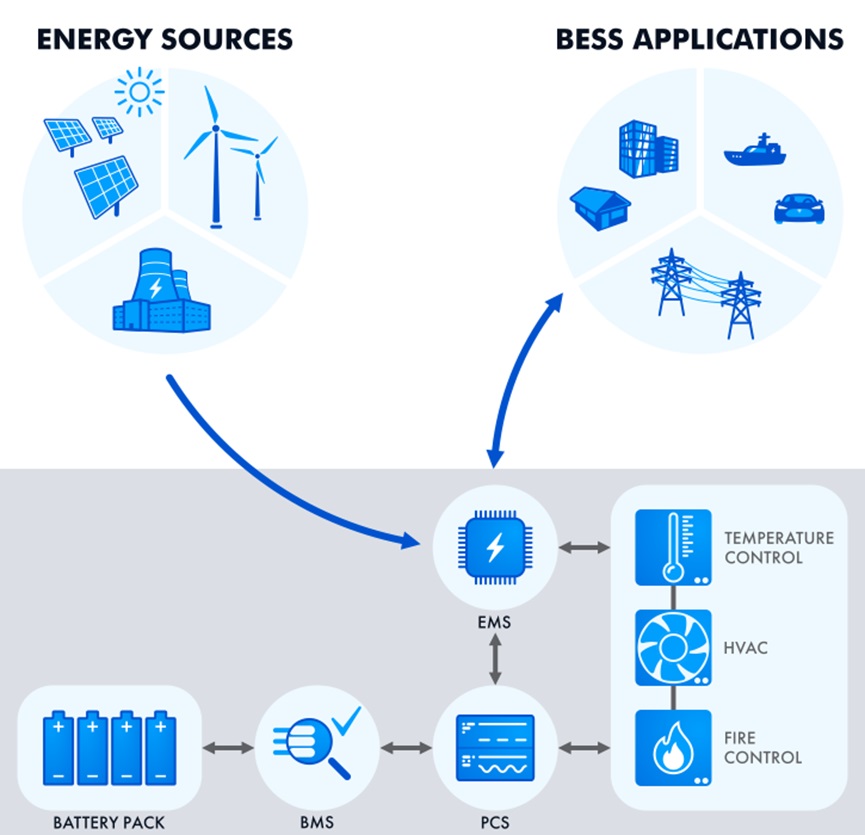In recent years, the power industry has been undergoing a revolutionary change. With the increasing proportion of intermittent energy sources in power production, the importance of Battery Energy Storage Systems (BESS) has gradually emerged. By properly configuring energy storage equipment, the power system can better achieve supply-demand balance and have stronger power regulation and dispatching capabilities. At the same time, battery energy storage technology is also experiencing the moment of its value realization, and various incentive policies and participation in power market response plans provide opportunities for enterprises to achieve energy savings and revenue generation.
Advantages of Battery Energy Storage Systems
The application of Battery Energy Storage System brings many advantages, such as intelligent energy consumption management, cost reduction, enhanced resilience, resource conservation, and improved environmental efficiency. BESS has a wide range of power and energy storage capacity, covering small household devices to large-scale industrial and public systems. Remarkably, in 2020, more than 31,000 and 100,000 residential BESS were installed in Australia and Germany respectively. Nowadays, large-scale BESS has been widely used globally, covering multiple countries including the United States, Australia, the United Kingdom, Japan, and China.
In-depth understanding of Battery Energy Storage Systems
What is BESS and how does it work?
Battery Energy Storage Systems (BESS) belongs to the Energy Storage System (ESS), which can capture and store energy from various energy sources and save it in rechargeable batteries for future use. When needed, the battery can release the stored electrochemical energy for various applications such as households, electric vehicles, and industrial and commercial facilities.
BESS is a composite system consisting of hardware and advanced software. Its main components include:
Battery system: composed of multiple battery cells that convert chemical energy into electrical energy. These cells are arranged in modules, and multiple modules form a battery pack.
Battery Management System (BMS): ensures the safe operation of the battery system. BMS monitors the state, parameters, and health of battery cells to ensure that the battery is not affected by hazards such as fires.
Inverter or Power Conversion System (PCS): converts the direct current (DC) generated by the battery into alternating current (AC) for various facilities. The inverter supports bidirectional energy flow, allowing for charging and discharging.
Energy Management System (EMS): monitors and controls the internal energy flow of BESS, achieving efficient energy management by coordinating the operation of BMS, PCS, and other components.
In addition, BESS also includes a range of safety systems such as fire control, smoke detection, temperature control, cooling, heating, ventilation, and air conditioning systems. These safety systems monitor parameters and respond to emergency situations to ensure the safe operation of BESS.

Figure 1: Battery Energy Storage System (BESS) Architecture
Types and Characteristics of Batteries
BESS employs various types of batteries, including lithium-ion batteries, lead-acid batteries, nickel-cadmium batteries, and more. Each battery type possesses unique characteristics that not only influence their applications in specific scenarios but also determine the efficiency of the energy storage system. The key characteristics of batteries include storage capacity, power, conversion efficiency, depth of discharge (DoD), and lifespan.
Custom and Off-the-Shelf BESS Solutions
In the market, BESS solutions come in two main types: custom and off-the-shelf. Custom solutions are designed to meet specific requirements tailored to particular scenarios but often require more time and cost for development. On the other hand, off-the-shelf solutions are pre-designed and ready for immediate deployment, suitable for general application scenarios. Each type of solution has its advantages and limitations, and the choice depends on specific needs.
Battery Energy Storage Systems (BESS) as Key Tools for Energy Management and Conservation
Battery Energy Storage Systems (BESS) are gradually gaining global recognition as vital tools for energy management and conservation. By flexibly configuring BESS, power systems can better address the challenges posed by intermittent energy sources, achieving a balance in power supply and demand. Whether in large-scale industrial facilities or residential environments, BESS offers feasible solutions for optimizing energy utilization and enhancing environmental benefits.
